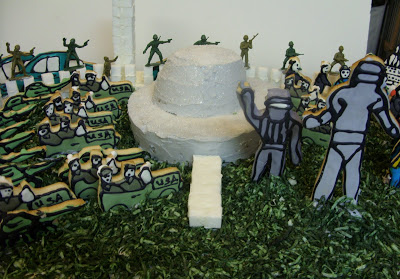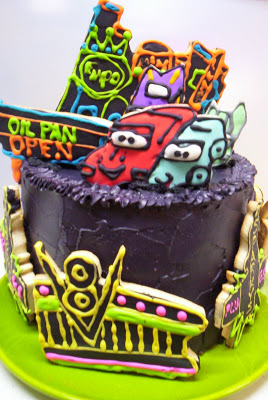This is the week Midwesterners make sure the flashlights and weather radio have fresh batteries, the storm cellar is easily accessible, and important documents are ready to grab in one central place. Extra medications, car keys, a spare pair of eyeglasses, and old pillows for head protection are also great to have on hand in your sheltering area. Surviving a tornado teaches a person a number of things like keeping your tetanus jabs up-to-date, and taking the reports seriously. When we made our way to the storm cellar that evening, we didn't really expect anything to happen. Child, dog, and weather radio in tow, we did it anyway, and lived to be posting this today.
A week without power presented a number of challenges (flushing the toilet, for example) and while I enjoy camping, most campsites aren't littered with broken glass, plaster, a collection of out-of-print cookbooks (sob) and the neighbour's hay barn atop your motorcar (though truth be told, I always hated the Volvo).
Don't underestimate the power of even a small tornado. Don't believe me? Click HERE, HERE, and HERE too. This was the work of a small tornado. There were actually two-the other one hit in town (we live in the outlying countryside). Imagine what a larger one would bring.
I was glad, as we began cleaning up that I was already serious about food storage. Cooking was the very last thing on my mind, and we just don't live in a place where you can run out for a quick bite, or groceries for that matter. Besides, I was somewhat occupied with other activities, like pulling large shards of glass from my walls, my carpet, between books in the bookcases (still not sure how that happened). Four years later, I'm still finding things in the yard, or hunks of melted plaster behind cabinets. Being able to grab a jar, pry it open and have food handy really made a world of difference as we tried piecing our home back together. I like potato crisps and ice cream as much as the next rural resident that grabs a quick snack at the gas station on the highway, but it gets old after a while. Poor Danny still can't look at a box of cereal as he ate so much of it straight without milk in the days following the tornado. Once we got over the initial shock, and the reality of what a mess we had to clean up sunk in, food became a welcome bit of normalcy. I may have regarded food in terms of subsistence prior to that June evening, but after, I've kept a watchful eye on the supply of dried fruit in the larder. Don't ever take raisins for granted. Raisins and clean water can save your life.
In the years since, I've been more methodical in my food storage, and I do a rather good job of rotating items out. For rice and beans, I'm a fan of hard plastic bottles that juice comes in, but then I find it easier to pour than scoop. They work well for sugar also. Small soda bottles are re-filled with water and kept frozen for power outages, transporting groceries home on hot days, and the occasional injury requiring an ice pack. I do canning, but that really only keeps me set for about a year (freezing won't help much if you lose power). With that in mind, I want to direct you over to Chef Tess Bakeresse, and her method of preserving dried foods as complete meals, in jars. This is genius. Obviously, I wish I'd known about this method years ago, but better late than never (it isn't like the weather in Nebraska is suddenly going to become more calm, and reliable-it was 87 degrees at the farm today, in Mid March!). While you're at the site, take a look at the beautiful painted breads Tess creates-they are nothing short of incredible.
If you're a local, or can drive in for the event, the Severe Weather Symposium on 31 March 2012 at UNL. If you're planning to go, drop me an email and we can organise a meet-up . You know I'll bring food. You know you want to see the weather balloon being launched (don't lie, you know you do) and the giant model of a piping plover ("Pebbles") will be making her annual appearance for souvenir photos (we have the yearly photos of Danny and Pebbles displayed on our piano. Yes, we are kind of strange. Some people do visits with Father Christmas, we do Pebbles the Plover at UNL).
Even if you don't live in an area prone to severe weather, a bit of preparedness is never a bad thing, and a $30. weather radio that can broadcast emergency information can pay for itself the first time you actually need it. In hindsight, the thing that really kept us from being too horribly freaked out by the experience was knowing what to do. You can always panic later, but having a procedure to follow, knowing you have prepared for it-it won't undo the power of a tornado or a hurricane, but you do tend to function better when it is a matter of grabbing a bag of flashlights, radio, etc. by the door to the storm cellar rather than trying to round up everything as you take cover. I keep an emergency kit in the car as well. There's a reason schools conduct fire drills (and if you live in the Midwest, Tornado drills). While I'm not the sort of person that panics imagining all the terrible yet unlikely things that can happen, and require my son to wear full hockey gear to play in the yard, I do like to plan for things I know have a reasonable chance of happening. Part of a child learning to be independent is knowing how to proceed in an emergency, and conduct his or herself without being crippled with anxiety if mummy or dad isn't there to tell them what to do. With younger children, it helps to give them a specific task to be in charge of. Danny took his flashlight duties very seriously the night of the tornado, and in a way it gave him a feeling of control (a very small bit, but still) over some small part of the experience. He couldn't stop the storm, but he could keep the light on.
Lastly, I want to mention how important our volunteer fire departments are in rural areas. With power lines down everywhere, and the firehouse itself being hit, they still managed to get out and check on the welfare of people. After the storm, other local departments made their way to farms bringing water for flushing toilets, livestock, and had cleaning supplies if you needed them. Yes, the Red Cross and FEMA also did great work (really, they did) but the under-funded and often overlooked VFD's really did come to the rescue of many a family stuck out on an acreage without power to run the wells. If you have a few bucks, and you're looking for a good place to send it, small town fire departments can always use the help.
Plan ahead, because if the weather of late in these parts is any indicator of things to come, we're going to have one heck of a severe weather season.
Saturday, March 17, 2012
Subscribe to:
Post Comments (Atom)






No comments:
Post a Comment